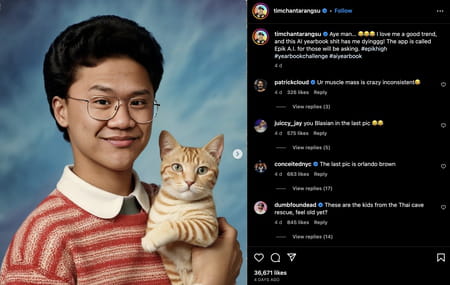How are people doing the AI '90s yearbook photo trend? They use this dangerous app...

Able to create fake images of you looking exactly like the real ones made years ago, the AI-powered app EPIK and its AI Yearbook are the worldwide trends that have topped the download charts. Despite the apparent innocence of the idea, there are many dangers behind it. Here's everything you need to know about the app and its hidden dangers.
Why the app that turns you into a 90s high school student is dangerous?
It's hard to browse Instagram, Facebook, or TikTok without stumbling across 90s high school photos. Since the beginning of October, many Internet users have been sharing retro yearbook-style class photos, in which each student is portrayed. These extremely realistic shots, generated using AI, are offered by the EPIK app, developed by Snow Corporation, a South Korean tech company. Able to create fake images of you thanks to a few selfies, the app is a hit in Europe and the United States, where it quickly topped the download charts on iOS and Android.
Several types of content can be generated by EPIK, but the most popular is the "AI Yearbook". You can send in 8 to 12 selfies to train the app, and it will generate 60 retouched photos, with vintage aesthetics like in the American TV series style "Beverly Hills: 90210" or "Buffy the Vampire Slayer". The EPIK app is free to download, however, the "AI Yearbook" option will cost you between $4.99 and $9.99.
If you type the #epik hashtag on Instagram, you'll find a large number of accounts participating in the 90s yearbook trend, including such influencers, as Bretman Rock, Eva Mikulski, Tim Chantarangsu, and others.

Just like the situation that arose with the controversial FaceApp filter application, EPIK raises significant concerns regarding the security of users' personal data. This platform employs advanced facial recognition technology to create images, a process that involves the collection of not only biometric data but also a wide array of other sensitive information from its users. Furthermore, when it comes to the app's privacy policy, it offers very limited assurances and fails to adequately safeguard users' privacy.
There is a high risk of personal data theft: the application collects your biometric data. It is likely that the company will use these photos to train its artificial intelligence models, without first obtaining your consent. There is also the problem of constantly improving the performance of artificial intelligence. In a context where a historic Hollywood strike has been going on for several months, with screenwriters and actors in part protesting against AI, which is accused of plagiarizing artists and making the industry more precarious, this phenomenon is not going down well.
In a post on the X platform, screenwriter Franchesca Ramsey urged people to stop using it, as selfies may be used to train AI programs in the future:
People paying to train AI w their pics isbad. there are serious legal & ethical concerns. AI plagiarizes from artists & is actively putting ppl out of work.
— Franchesca Ramsey (@chescaleigh) October 4, 2023
folks are passing around fake images to deceive ppl & the tech is getting better bc of your high school pic trend https://t.co/1cFNvQ8wPM
